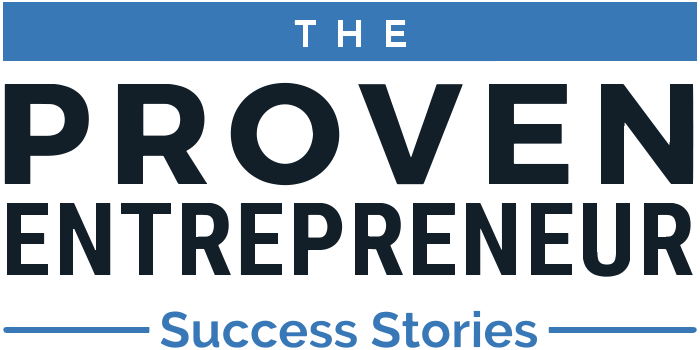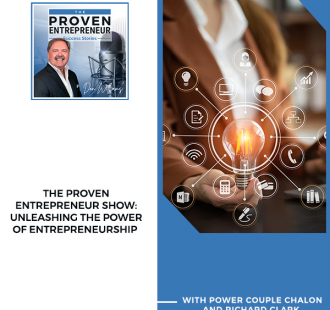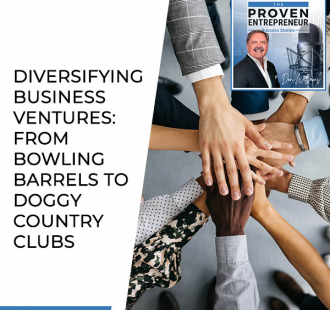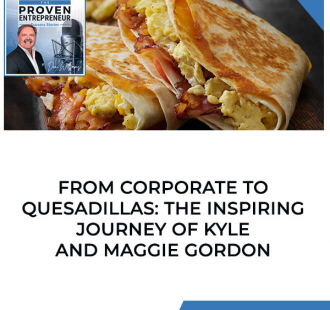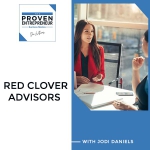Entrepreneurship is a challenge but is very rewarding. You have to be persistent and goal-oriented if you want to achieve your goals. Listen to your host Don Williams as he dives deep into a conversation with Jodi Daniels about data privacy and compliance. Privacy is one of those complex things you must understand if you want to incorporate an excellent leadership style in your organization. Jodi Daniels is a Certified Informational Privacy Professional with more than 20 years of experience helping businesses get to where they want to be. In this episode, she shares critical insights on the importance of communication, due diligence, and building relationships with people. Are you facilitating open communication and setting realistic goals in your business? Tune in to learn more about privacy, marketing, business strategies, and inspiring people through leadership.
—
Listen to the podcast here
Red Clover Advisors – Jodi Daniels
Data Privacy And Compliance Guru
Welcome back to this episode of the show. I have my good friend from Red Clover Advisors, Jodi Daniels. Jodi, welcome to the show.
I’m so glad to be here. Thanks for having me.
Thanks for coming on. Let’s jump right in. Tell me. What do Red Clover Advisors do?
We are all about helping companies establish trust with customers by complying with different privacy laws and helping you figure out if you can collect that data, what you should do with it and what you should tell the end person.
Tell us about some of the big privacy laws entrepreneurs should know about.
It also matters where your customers are. One of the biggest misnomers is people always think about where their company is located. It doesn’t matter where your company’s located. We all could be in Tahiti drinking our little strawberry fruity drinks and have customers around the world. We have to deal with the privacy laws where our customers are.
The big ones are going to be in the EU GDPR. That’s the General Data Protection Regulation. Lots of people are familiar with that law because a couple of years ago, cookie banners popped up all over the internet that said, “We’re going to use cookies. Accept me before you could use the site.” That’s what most people think about GDPR, the cookie banner law. It’s so much more than that but that is the external view.
If you want to establish a business, you have to be willing to take a path, a process, and a journey to get there. Click To Tweet
If you have customers who are from the EU, you have to know that law. It’s the gold standard of privacy laws around the world. In the United States where you and I are, we have some federal laws. We’re all familiar with the ability to unsubscribe from an email or a text message. We’re like, “Stop calling me during dinner time.” Some federal laws are all about controlling that but what’s new on the horizon are our state privacy laws.
We have California as the first state who has a privacy law and other states like to follow. We have what’s called CCPA. It’s the California privacy law. There is a new California privacy law coming and then a Virginia law and a Colorado law. That’s all we have with other states trying to play catch up and join the California, Virginia and Colorado party. Those would be the big ones that people should be paying attention to. We won’t talk too much but if you’re in the health space or financial space, there have been privacy laws for a long time, especially here in the United States, for those that you’d have to consider as well.
Thank you for sharing. In one of my businesses, we’re in the contact center business. We do phone calls, inbound and outbound, for large corporations all across the world. 2002 is when the federal government passed Do Not Call where consumers could opt out of having their phone number called. There are 2 or 3 sets of federal regulations.
Some overlap and some do not. Some apply to some businesses and some apply to all businesses. In addition, 38 states have their own Do Not Call regulation. It gets pretty complicated. Let me ask you. Do you see the same thing happening with data privacy that we have 1 state firmly entrenched and 2 more coming on? Do you think that in a couple of years we catch the other 47?
Yes. In the privacy space, the privacy people say, “3 down, 47 left to go.” That’s where we are for a variety of different reasons. We do have multiple states. Over several years, we have introduced privacy legislation and it hasn’t passed for a variety of different reasons. Washington State is back for the fourth time with its new privacy law. Florida on both sides, House and Senate, have introduced privacy laws again. It’s the same with New York. Each time, they keep learning and iterating. As you get other states passing, that then puts further pressure on those states who keep introducing to do it. After a while, you’re going to have so many states. The others are going to look and say, “I should join the party.”
About the data breach laws, we didn’t talk about that because we’re going to focus on the privacy side. If you were to have a data breach, there are 50 data breach laws that you’d have to contend with. Every state has its own. There is no national data breach law. People always say, “Are you going to have a federal privacy law?”
GDPR is a national approach to privacy. We have one of those in the United States. There are lots of arguments both pro and con. The reality is privacy is complicated. We already have existing national sectorial privacy laws, like the Do Not Call, email unsubscribe, HIPAA for healthcare and GLBA for financial. For anyone who doesn’t know what that is, that’s the big privacy statement you get in the mail from your credit card or your bank and you throw it away. That requirement is from the financial side.

You have all these sectors already with privacy laws to smoosh all together and then get 50 states all to agree. Does the federal law override the state’s ability or is it the floor and the states can still come on top? That’s complex. To make it meaningful and work with future technology is complex. Regardless of what side of the political aisle you’re on, it’s hard to agree on anything. Privacy is one more of those complex things.
From a global trade perspective, it’s becoming challenging from a business operation perspective to have 50 state laws. I’m in the business. That would be awesome for my business but it’s not awesome for businesses. However, the reality is I don’t think we’re going to have a federal law for quite some time. Everyone should get ready for a patchwork state of privacy laws.
If it follows the same path as Do Not Call, we’ll end up with all of the above.
You’ll have a floor and the state law that can go above it. That’s exactly right.
You could violate federal law and not violate individual state law and/or vice versa. The FTC, the Federal Trade Commission, the FCC, the Federal Communication Commission and to a lesser extent, the SEC and some of the financial offices all have their versions of Do Not call. Somehow, that business owner has to try and figure out how to be compliant with all those. Sometimes, it’s not simple.
What’s unique to these modern privacy laws is we are talking about data in every aspect of your business. Some of these laws include your employees. Some of them include your vendors. It’s a misnomer that it’s only B2C. Some of them include B2B. It also involves when I sign up for an email or how I do any type of digital targeting or digital measurement. It includes when I’m shipping and sending.
Every aspect of the operations of a business is where you have to think about that personal data. Maybe I don’t make calls so I can ignore all that Do Not Call stuff. I’d be like, “I’m off the hook.” Except if you do anything else, you’re going to still have all that data and think about, “When am I collecting? How am I using it? Who am I sharing it with?” You then have to think about what the privacy law obligations that you have to contend with are. That’s where you’re going to have to start matching up states.
The process that's going to work for others couldn’t be your process because what works for you doesn't work for somebody else. Click To Tweet
I had a call with a very small company where they don’t have to comply with one of these laws because they’re, technically speaking, too small. They fall under the floor or the threshold that one of the state laws put in place but they know from a competitive standpoint that they should comply. If they don’t comply, their competition will be. You’re going to have to start thinking about, “Who are my competitors?” Even if you technically don’t have to, you should, because that’s what customers, whether you’re B2C or B2B, will start expecting.
Thank you so much. It sounds to me that you are the authority in the space. If you have questions out there, you call Jodi because she has answers. I want to go back to young Jodi. Tell me about the household that you were raised in as a young girl. Did someone set an entrepreneurial example for you in your childhood? Was it your mother, father or grandparents?
They both did. No one worked at traditional corporate. My dad had his business. He was also in sales. He could sell anything. My mom has always been in residential real estate and owned her brokerage or worked for others. It’s still always about building your business. However, that isn’t what I thought I was going to do. While raised in that environment, I didn’t set out to say, “I want to have my business.” It took a path, a process and a journey for me to get there.
In this episode, we’ll explore at least some of that path and journey. Tell us about your first job where you got paid. It’s not where you mowed the yard because mom and dad said you had to but the first job where you got paid. What was that job?
I can think of two. The first one was babysitting. It’s a very typical job for a younger girl. I do remember talking to my friends. When I was a girl, The Baby-Sitters Club was a popular series as a book to read. I remember I had this cool little fort off to the side of my driveway. I remember something about my babysitting club or ideas that I’d have. There were families on the street that I would babysit for. It was that one.
As I got older, when I was sixteen, my very first real job, if you will, with a paycheck from an official place was at a drug store. I was super excited because I got to wear the key ring. I remember feeling official because I’d have this cool key ring and it would jingle. That was my job, except I wanted to work at GAP but I didn’t get that job. First, I got another job and then the job at GAP. I quit and gave up my cool key ring to work at the GAP. I worked there for a long time. I loved it. I still fold my clothes like I did back when I was sixteen.
After school, you backpacked across Europe. You joined the United States Marines and then went to university. What’d you do?

I had a fancy job all lined up but that summer, I took care of my dad. The first summer after college while lots of people would go backpacking before they start their job typically in August or September, my dad got sick right at college graduation. I went home, took care of him and nursed him back to health. I’m excited to say that he is still here and doing well. It was a very interesting summer but that is what I did. I just nursed my dad.
I then came back to Atlanta where I had gone to school. I went to Florida to take care of him. I came back here and started an accounting job. When I was in school, I was an accounting major. When you got an internship and did well at the internship, then you got this job. I felt like it was a fancy job at the time. I rode the path as you were supposed to do so it wasn’t a fancy job. It was probably one of the less-paying jobs of all of my classmates but you got one. You were guaranteed one.
I worked at Deloitte. It was a wonderful place to work. It was a lovely experience but eventually, it was not for me. I remember early on people were saying, “What are you doing in accounting? You don’t have the personality to be in accounting.” I loved the relationships. I had a great client when I worked at the firm and wonderful people. That’s honestly what kept me there for nearly the five years I was there.
It’s such a wonderful foundational skill for an entrepreneur to understand finance.
I worked on the auditing side. The foundation’s even broader because for someone coming out of school who knows nothing, you are thrown into a client environment. You have to learn how to deal with clients and different tiers in a firm structure. I sat across from a partner that’s 20 or 30 years older than me. Back in the day, do you remember where you had to have a phone line to the internet and share the phone or the phone line? I’m sitting across from a partner. You have to learn how to be able to communicate.
In the actual work, you have to be able to interact with clients who are very senior to you and understand the process in the overall business. From an audit perspective, you have to understand the entire business and operations. You’re focused on the financial controls piece. Fast forward to the work I’m doing, it’s the same thing but instead, I’m focused on the personal data as opposed to the financial piece. It’s about asking good questions about the process. It is an amazing foundation for anyone going through. Lots of people do it for 2 years and then move on but I was able to stay for 5. 5 years is a big deal in the big 4 worlds. It is something because I use those skills every day.
Where I’m sitting in the studio, I’m about five minutes from the big Deloitte University in Westlake, Texas.
Entrepreneurship is a challenge. It's a journey and some days are amazing and other days feels overwhelming. Click To Tweet
I was always disappointed. They built it before and then we had 9/11. I never had a chance to be able to go but I hear wonderful things about it.
It is a phenomenal facility from what you can see from the road. It’s not open to the public. It’s in the middle of what used to be the Circle T Ranch, which was a very large ranch owned by the H.L. Hunt family here in Texas. You went and did accounting at Deloitte. Is Red Clover your first entrepreneurial company?
It is but it was after a bunch of different hops. I woke up one day and decided, “Accounting is not for me.” I went to the Home Depot where I did some financial work and then strategy work while going back to get my MBA. I did a full-time MBA and full-time work. When I was done with that, I went over to Cox Enterprises, which is a big media company. For over a decade, I did strategy work and went to one of our subsidiaries, which was AutoTrader.com. They then merged into a different subsidiary called Cox Automotive, if anyone’s ever heard of that.
For over seven years, I did behavioral targeting. I stalked you for ads before Facebook ads did that. Now, everyone goes to Facebook and they’re like, “I shopped for those shoes or the blender and it’s showing up in my feed.” I did that for cars. If you bought a car a couple of years ago, I did that. You’re welcome. From there is how I got into privacy because the industry came together and said, “We need to prevent government legislation on this.” It worked for around ten years.
I was responsible for that compliance from the company’s compliance with the self-regulation happening in the online industry. I created a full-time job for myself. I thought that would be fun so I built a privacy program at Cox Automotive. I then went over to Bank of America and was their Digital Privacy Expert for two years. I then said, “That was fun.” Nineteen years after the day I started my job at Deloitte was my last day at the bank. That’s when I opened Red Clover.
It speaks to most entrepreneurs. It is a path and a journey. There were many stops, twists and turns along the way that got them to where they are. Think back across your career either on the W-2 side or as an entrepreneur. Share a hard lesson. It is something that you learned the hard way that at the time might’ve been painful but in retrospect, turned out to be a huge plus for you along your path.
I can think of a couple of examples. One of them was in working with the sales team. It was something I hadn’t done before. It was understanding how to communicate the value of something I knew well but the sales team was new to them. We were also trying to convince clients and figure out how to work with all of those different people. I thought it should be done one way and that was a clash with how other people thought it should be done. In hindsight, I understand I have to change the way I communicate and the way I’m explaining the information so that the other side gets it and it resonates with them. I didn’t understand that because it was all new to me at the time. That was one.

The other is it’s important to continue when you hand off a project to someone. Going back to communication, it is making sure that there’s clear communication and expectations, maybe follow up along the way. There have been some times where I’ve handed it off a little bit too much and then, unfortunately, the project derailed because that person needed more guidance and expectations to help make sure that the other side also got what we thought that they needed.
I was the person who knew at the beginning and who I handed it to didn’t have all of that same information. I handed it off because I didn’t want to micromanage. I didn’t appreciate who that person was and how I needed to manage that person so, unfortunately, the project derailed. The other side wasn’t quite as happy. Even though we did all the work, the process and the way we did it weren’t the best.
You see communication everywhere, whether you’re in a company, you’re an entrepreneur or in a personal relationship. You think one thing and the way someone else thinks is different. You have to understand how the other person is thinking and be able to translate that into their language. You have to follow up the process that’s going to work for them because what works for you doesn’t work for somebody else. That’s the short version.
We’re all seeing things through our glasses. It’s impossible for me to see things through your glasses. The only option I have is to say, “How did you hear it? What do you understand.” It’s for you to give it back to me. I was on a phone call with a client. He shared a statement that clarity is kindness. I was like, “Tell me more about that.” That clear communication is very kind.
Sometimes, entrepreneurs, managers, supervisors and leaders shy away from being clear because they don’t want to sound too forceful. Giving people clear communication is the highest kindness so that we all know exactly where we’re at. Thanks for sharing that. What about a warp speed moment? Things are going pretty well and 1, 2 or 3 events happen. You take a couple of actions and all of a sudden, you have this unbridled unrestrained growth. Do you have a warp speed moment you can share?
That’s like the hockey stick moment. I don’t know if there’s a perfect one. I feel like I experienced it in 2021 for two reasons. One, in the privacy space, several privacy laws were passed in 2021. The forward-thinking companies and ones that liked to plan started to decide, “I have to plan all of this now.” I started to feel that in Q4 of 2021. At the same time, how did they all find me? Those are those seeds that I’ve worked so hard over time to plant. That is where it’s not perfect like, “I did something. Look at all of the things.” It’s that hard work and the diligence of building relationships with people.
We’ve had a relationship over time and we didn’t meet. If we met yesterday, you weren’t like, “Come on out.” We had to build a relationship. The same is true in business and many relationships, whether it be partners or referral connections. Even the content that I’ve been putting out has been consistent in continuing to try and understand the audience that builds the content so that Google is doing its thing behind the scenes. All of those seeds are things that I’ve done over time. I felt like with companies paying attention and what I had been doing, those two things are starting to work and you can see the hockey stick moment.
If you’re goal-oriented and trying to prove yourself on what you’re capable of, you’ll keep moving up that little invisible ladder. Click To Tweet
There’s some truth in that. Many times, entrepreneurs looking for the magic bullet are like, “What’s the one thing I can do and buy? What’s the one service I can incorporate that will put me on the rocket ship and things will explode?” The reality is this. Be better every day. Ultimately, that will catch up. I love that. What about a golden nugget? What is some wisdom from the mind of Jodi that we all want to know?
The one that I love the most is entrepreneurship is hard. It’s a challenge and a journey. Some days are amazing and on other days, you’re like, “Why am I doing this again?” You can apply that to parenting. I love my kids. Some days, I’m like, “You need to go back to school.” Through all of that, it’s persistence. It’s the belief of the goal or whatever it is that you have in front of you. I like what you said. Focus on something that you can do. Persistence is a theme that I’ve had as a kid.
I’ve always been the Type A hardworking person that sets a goal and says, “I want to get there.” Sometimes, those goals are hard. Sometimes, they shift. Sometimes, they change. Sometimes, there are obstacles or mountains. Pick whatever phrase works for you in there. You keep inching up and celebrating each little milestone. For me, I celebrate every day.
I’ve had this in a personal experience and a professional experience. I know where I want to go. Some days, it feels like I took 1 step forward and 5 steps back but then, the next day, I get up and it’s a brand new day. To me, every day is an opportunity. I truly feel that way. I’ve always been that way. When you blend every day is an opportunity with persistence together, you will get there. I’m a very impatient person. I wanted to get there. I try and remind myself, “I’m getting there. I’m on the path to where I want to go. I’m doing the right things. I’m consistent.” That is the motivation that keeps me going. Every day is an opportunity. Continue the motivation and persistence.
On persistence, you can’t lose as long as you’re still trying. One day, you’ll get there. I can’t predict what day. I don’t know what day but one day. That’s great. We’re going to put you in a time machine to take you back to twenty-year-old Jodi. You get 60 or 90 seconds to share a piece of advice or two with your 20-year-old self about something you know now that you didn’t know then but had you known then and had listened and acted on that would have sped you along your path. What do you tell her?
It’s very interesting because we talked about being goal-oriented. I’ve always been that way. I also was always trying to prove myself. I thought if I could show all these people what I was capable of, I’d get this chance and be able to keep moving up the little invisible ladder that I had. I would say, “If I didn’t put all my effort into that and focused a little bit, was a little less serious, was having a little bit more fun, believed in the process more and tried less on trying to prove who I was, people would have already seen the value.” What happened is people saw this strong personality and didn’t understand the reason behind it. It was misinterpreted.
I would do that. I would make sure that I was having fun and doing a good job but not always paying attention to as much as what people were thinking around me. If I was always thinking, “What are they thinking of me?” I’m so focused on my actions related to that. If I had stripped that, I could have been free of all of it and focused on, “Here’s this great thing. I’m going to work hard and build these relationships.” It would have been a little bit easier in my corporate life.
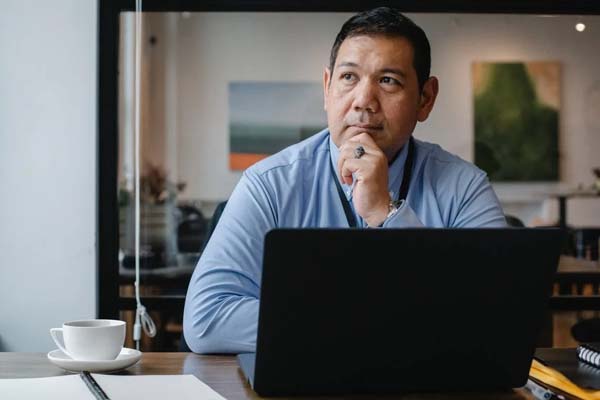
Most of the time, they’re not thinking about us anyway. We think they’re thinking about us but they’re not. They’re oblivious. If somebody wants to reach out to you, what’s the best way to do that?
There are two places. I spend a lot of time on LinkedIn because it’s my happy place and then my website. I have lots of resources on what is this privacy thing and this trust thing and what you need to do at RedCloverAdvisors.com.
You can reach out to Jodi Daniels at RedCloverAdvisors.com. I met you on LinkedIn originally. We knew each other in other ways but we connected on LinkedIn. It’s been my distinct pleasure to have you on the show. Thank you very much.
I appreciate it. It’s been a pleasure. Thank you.
We’ll see you next time on the show. Thank you. Bye.
Important Links
- Red Clover Advisors
- The Baby-Sitters Club
- AutoTrader.com
- LinkedIn – Jodi (Jodi Hoffman) Daniels
About Jodi Daniels
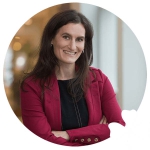 Founded in 2017 by Jodi Daniels, Red Clover Advisors is currently one of the few certified Women’s Business Enterprises, (WBENC), focused solely focused on privacy.
Founded in 2017 by Jodi Daniels, Red Clover Advisors is currently one of the few certified Women’s Business Enterprises, (WBENC), focused solely focused on privacy.
Jodi Daniels is a Certified Information Privacy Professional (CIPP-US), National Keynote Speaker, featured in Forbes, Inc., The Economist, Thrive Global, Authority Magazine, Medium and also a member of the Forbes Business Council.
Founded in 2017 by Jodi Daniels, Red Clover Advisors is currently one of the few certified Women’s Business Enterprises, (WBENC), focused solely focused on privacy.
Jodi is co-host of She Said Privacy / He Said Security podcast. Each week, Jodi joins her husband, Justin Daniels, a cybersecurity subject matter expert and also corporate attorney specializing in M&A and other business transactions, to talk all things privacy & security.
